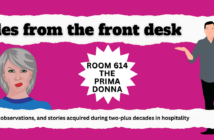by BENJAMIN HOTTEL, PH.D.
Smooth operations depend on a well-trained team, and pest management is no different. Since your staff members are on-site every day, they play an important role in minimizing pest problems. Employees are a hotel’s first line of defense against pests.
All staff should recognize and report signs of pest activity, no matter how miniscule a problem may seem. Whether it’s noticing rodent droppings or a single cockroach in the kitchen, these red flags could symbolize an underlying or potentially growing pest problem.
To equip your staff with the tools they need, partner with your pest control provider to educate your staff about Integrated Pest Management (IPM) practices that can help identify and prevent pest activity.
INVOLVE YOUR EMPLOYEES
IPM is a long-term solution, requiring ongoing maintenance and participation from your employees. Help involve your employees with these tips:
- Offer IPM training. Your provider can teach your team what signs to look for and when to report a potential issue.
- Prevent conducive conditions. Ask your employees to do their part in combating sanitation issues, cleaning spills immediately and keeping breakrooms tidy.
- Regularly inspect hot spots. Develop a schedule for select employees to check hot spots, especially storage rooms which can other-wise go unmonitored.
- Develop a reporting process. An employee spotting an issue doesn’t help if no one else knows about it. Implement a reporting process, such as a pest sighting log.
- Document the details. Make sure employees include important details when reporting a potential issue, such as date, time, location, and any conducive conditions.
Observations from employees can help develop a trend analysis of historical pest activity to help identify the cause of pest problems, so you can modify your IPM program as needed.
If you aren’t already following IPM guidelines at your hotel, contact your pest management provider to discuss how you can start an IPM program. With a rigorous IPM program and cooperation from your staff, you will be on your way to becoming a more responsible business that helps keep consumers satisfied and willing to return to your hotel.
WHAT IS IPM?
Integrated Pest Management (IPM) is a sustainable strategy for managing pests that reduces the negative effects of pesticides to people and the environment. IPM consists of the following core components:
- Identify pests in your facility. Staff can be trained to identify bed bug evidence, cockroaches, or other pests that might be encountered in a hotel. Trained staff can then alert management and pest management partners to new pest issues before customers notice the pests themselves.
- Monitor the effectiveness of your efforts. Effective pest management is a process, not a one-time action, so consistency and communication are essential to the success of your business’s pest control program. Between visits from your provider, check for signs of pest activity and any new conducive conditions that may have surfaced since their last visit.
- Prevent pest problems before they become an issue by implementing sanitation and exclusion practices. Enacting enhanced building-wide sanitation strategies for cleaning and waste disposal can help prevent certain pests from becoming established. Adding door sweeps and sealing up other openings into a hotel can help prevent pests outside from entering the building.
- Treat pest activity with treatments suited to your hotel’s needs. Based on your inspection findings, work with your provider to develop a custom prevention program that emphasizes proactive techniques to ensure your cleaning and maintenance efforts reduce pest hot spots.
Benjamin Hottel is a Technical Services Manager for Rollins. He provides technical support and guidance across all Rollins brands in the areas of training and education, operations, and marketing. For more information, email [email protected] or visit www.orkincommerical.com.




